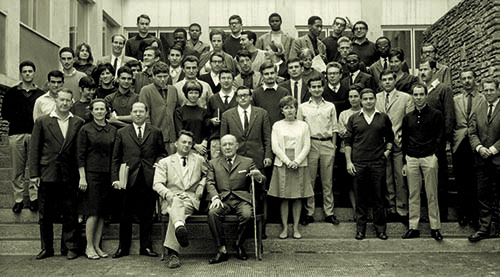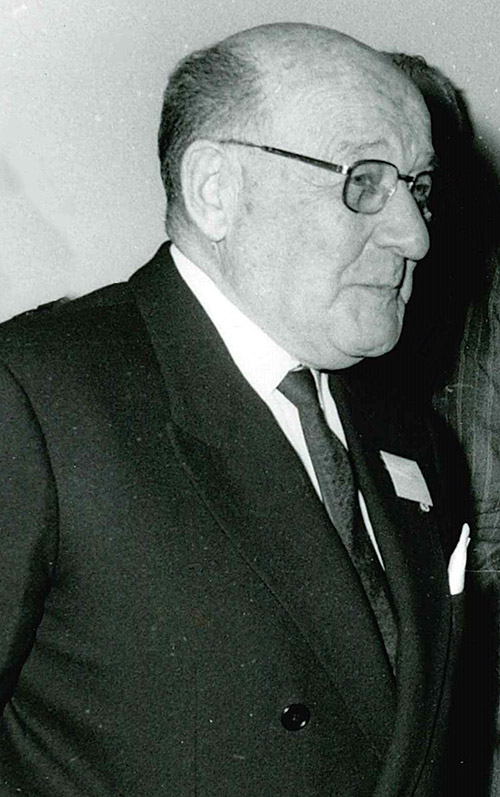
The History of CIFE
The Centre international de formation européenne (CIFE) was born out of a crisis of European integration. In 1954, when the European Defense Community had failed, our founder Alexandre Marc considered that states could not be relied upon to build a united, federal Europe. Rather, citizens had to be educated to become the vanguard of this project.
In its early years, CIFE's programmess focused on spreading the idea of a united Europe among citizens of all professions. Over the past three decades, our organisation has shifted its focus to interdisciplinary and itinerant master programmes for international students. Today, we offer seven different master's programmes and various short educational formats. In continuously expanding its field of activity, CIFE has been supported by an operating grant from the European Union.
This unparalleled assessment of service to a peaceful, prosperous and more just Europe owes much to CIFE’s presidents: Grégoire Gafenco, Enzo Giacchero, Jean Rey, Lord George Thomson, Gaston Thorn, Émile Noel, Michel Albert, Jean-Claude Juncker, Philippe Maystadt and, today, Herman Van Rompuy.
It also owes much to those who have been Directors, Alexandre Marc then Ferdinand Kinsky and all their collaborators, expert as much as loyal, to their objective. It owes much finally to all those who have answered the call for the development of the EU and passed on throughout the continent the message that CIFE has taught them.

The College of Federalist Studies - 1965. CIFE founder Alexandre Marc sitting to the right.
Our mission
- Inspired by the European model: living together in peace, prosperity and with responsibility
- With an international team and decentralised structures
- With a federal concept of European education: “unity in diversity”
CIFE is committed to:
 Academic excellence Academic excellence
Our faculty consists of renowned academics providing students with expert knowledge.
 Professionalisation Professionalisation
Our aim is to transmit not only academic knowledge but also those professional skills and competences required in European and international organisations.
 Interdisciplinarity Interdisciplinarity
All problems are dealt with from the perspective of different academic disciplines in order to gain an all-embracing understanding of today's world.
 Multiculturalism Multiculturalism
Each year, our students come from all over the world, representing on average 15-20 nationalities.
 Tolerance Tolerance
In an international community, we owe each other respect and the recognition of our differences.
 Learning and living Europe Learning and living Europe
Students not only learn about European integration, but experience the continent from different perspectives by living in Berlin, Canterbury, Nice, Rome, Istanbul or Tunis.
Who is Alexandre Marc ?
Interview with Claude Nigoul about the founder of CIFE
Alexandre Marc died 21 years ago, at the end of a long life that marked his century. Many people saw in him the militant of a united Europe, for which he was, from the end of the war on, present in every battle, from the Hague Congress to the struggles for the European Defence Community. But he was above all a philosopher, founder of the Ordre Nouveau (New Order), the crucible of non-conformist thought in the 1930s. It was there that he laid the foundations of federalist personalism, in which one could find, long before they were widely popularised, the ideas of a European federation, of a basic income, of the principle of subsidiarity, revolutionary ideas of a prophetic doctrine that he taught to generations of students from all countries, gathered in the programmes of the Centre international de formation européenne, of which he was the founder in 1954.
In an interview, Claude Nigoul, former Director of the Institut Européen des Hautes Etudes Européennes and Special Advisor to CIFE, traces the main lines of thought of CIFE's founder.
Read the interview in French
Claude Nigoul has also recently published a Policy Paper on Alexandre Marc - Un grand philosophe du vingtième siècle doctrinaire de l'Europe fédéraliste as well as his new book Alexandre Marc et le fédéralisme personnaliste. Quelle actualité? (Editions du Cerf, September 2021).

At CIFE, we firmly believe that European integration is an historical achievement, a model of how people may live together in mutual tolerance and respect, in peace, in prosperity and with a shared responsibility. CIFE’s share of responsibility in a Europe looking towards the future, is to teach and learn about European integration and to enable students to share this knowledge, over and above pure scientific interest.
CIFE itself lives up to what it teaches: Our staff is international, with employees from France and Germany, Belgium, Romania, Moldova, North Macedonia and Turkey. With offices in Nice and Berlin, in Brussels, Tunis and Istanbul, CIFE’s decentralised, almost federal structure allows for autonomous teams to run academic programmes to meet specific requirements, and yet binds the whole team together in terms of its European commitment.
In CIFE’s vision of Europeans living together, federal structures would best allow for a reasonable balance between diversity and unity. The choice of federalism means an ongoing, open process of addressing each problem, each task and challenge, at the level of governance best suited to deal with it – led by the principle of subsidiarity. Understood in this way, federalism is a method, an attitude, which must be continuously under review. CIFE is committed to this open-end method of reshaping the European model, together with its global academic network of colleagues and its students from all continents.
|